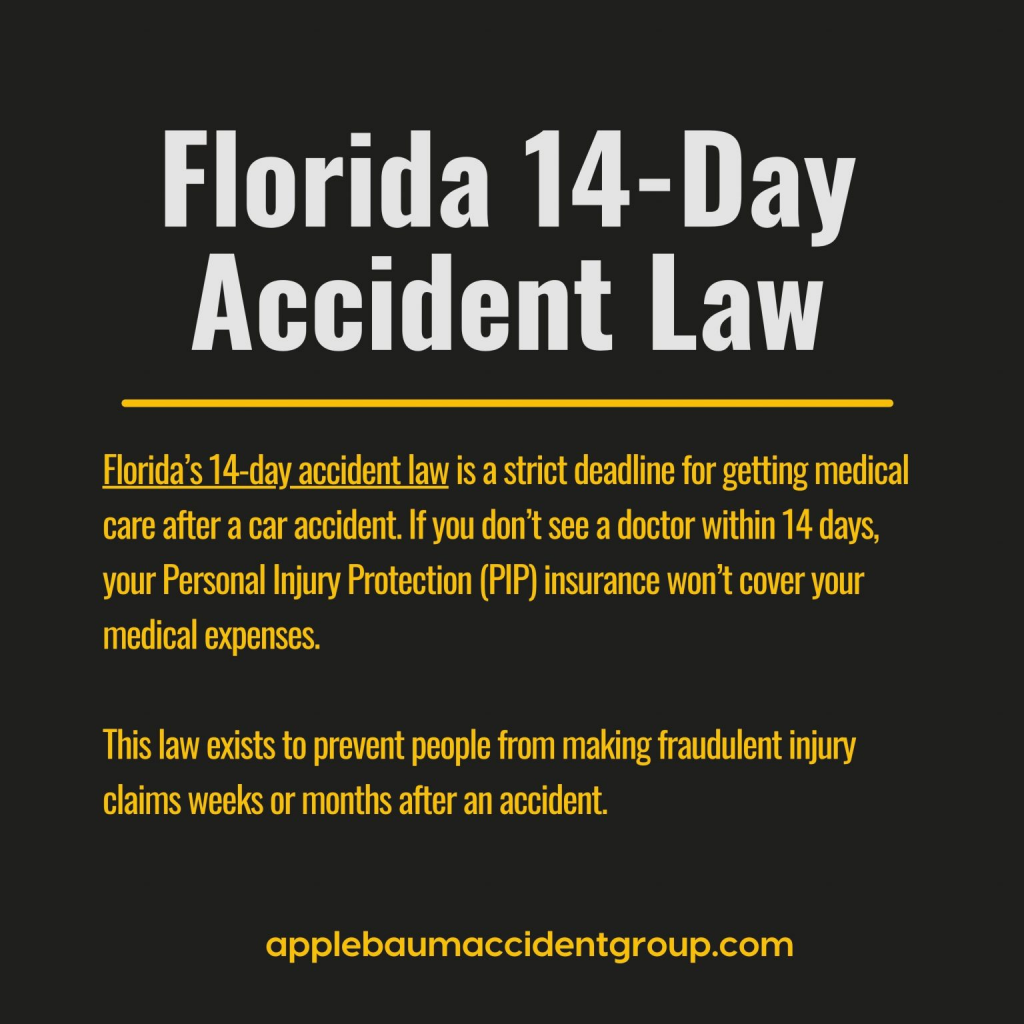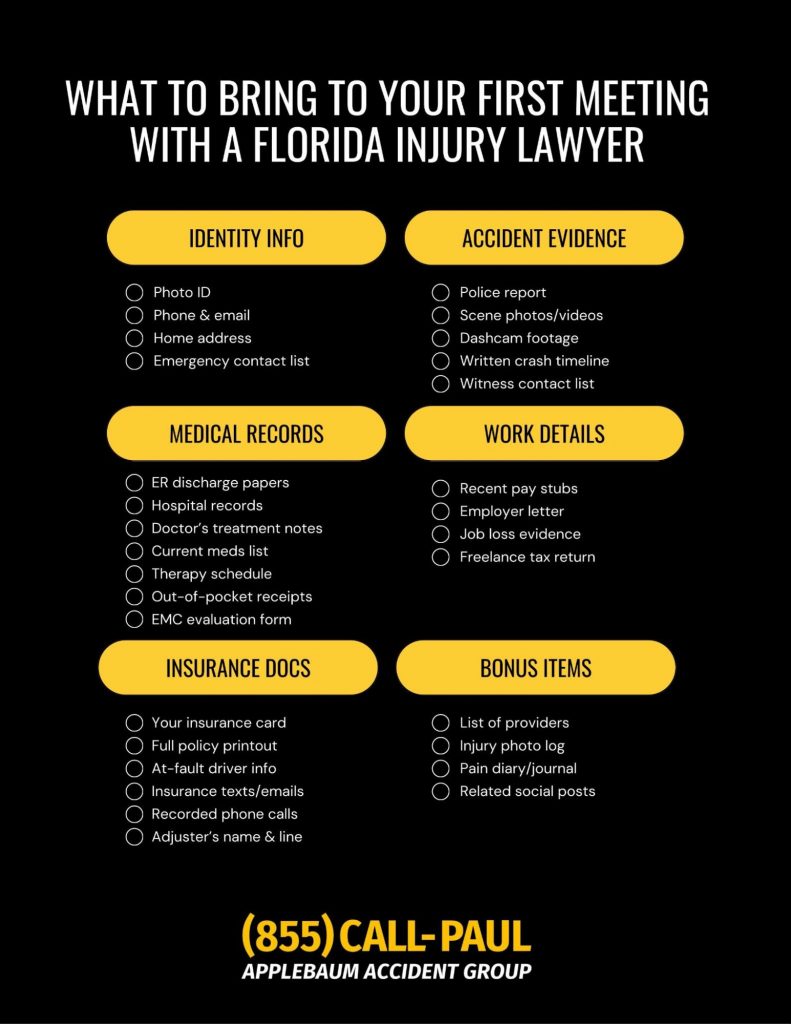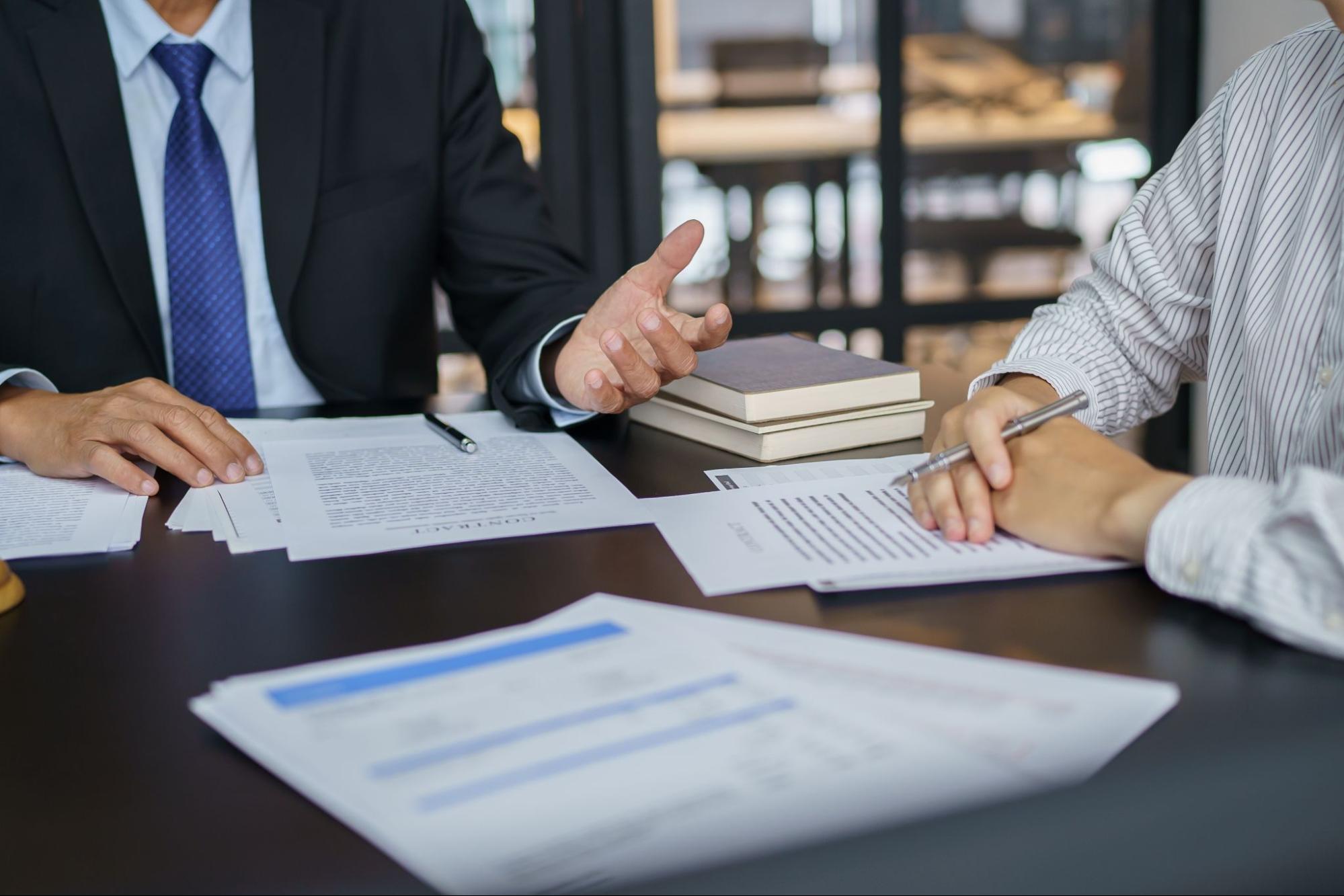For your first meeting, bring your medical records, police report, insurance info, photos, a written timeline, witness contacts, pay stubs, and any communications with insurers. These help your lawyer assess your case quickly and build a strong strategy from day one.
Most people aren’t just hurt after a car accident, they’re confused. They’re overwhelmed. And when it comes time to meet with a lawyer, they walk in with more questions than answers, unsure of what to expect or what to bring.
This meeting is the foundation of your personal injury case. Walk in ready, and you’ll walk out with clarity. In the next sections, we’ll cover exactly what documents to gather, what questions to ask, how Florida’s laws impact your case, and even how to emotionally prepare, so you’re not just another file on someone’s desk. You’re a person with a real story, and the right preparation ensures that story gets heard.
This Meeting Matters More Than You Think
If you’re reading this, chances are you’ve just experienced a car crash, and now you’re trying to make sense of what to do next.
This first meeting with a personal injury lawyer isn’t just routine, it’s the structural base of your entire case. Show up with the wrong documents or an incomplete timeline, and you risk weakening your claim before it even begins.
Florida’s 14-Day Rule: A Time-Sensitive Threshold

Under Florida’s Personal Injury Protection (PIP) laws, you have just 14 days from the date of your accident to seek medical care.
This includes care provided by emergency services, your primary doctor, or even a chiropractor. If you’re past the deadline, not all is lost, an Emergency Medical Condition (EMC) evaluation can still validate your injuries for coverage, but timing is everything.
Why Most People Walk in Unprepared
Many accident victims show up to legal consultations with nothing more than a vague recollection of the crash, and leave feeling more uncertain than when they arrived.
Once a client said, “I left my consultation with my former lawyer having more questions than I came in with…” And it’s no surprise. Without guidance, how are you supposed to know which records matter, or how to talk about what happened when you’re still processing it yourself?
Document Checklist

Identity & Basic Info
Start simple. Your attorney needs to verify who you are and be able to contact you.
- Government-issued photo ID (such as a driver’s license or passport)
- Accurate contact details (phone number, email, home address)
- Emergency contact list, helps your legal team stay in touch even if you’re unavailable during treatment or procedures
Evidence From the Accident Scene
Your account of the accident is just one version of events. The more evidence you bring, the more your attorney can independently verify and build a stronger narrative.
- Police Report: This third-party documentation outlines who was involved, what was said, and often includes a preliminary fault assessment.
- Photos and Videos: Bring any images of the vehicles, injuries, street signs, or road conditions.
- Dashcam Footage: If you have it, this can be some of the strongest evidence of what actually happened.
- Written Personal Account: Write it down while it’s still fresh: what you saw, heard, felt, and feared. Details fade quickly.
- Witness Names And Contact Info: Eyewitnesses can clarify fault and support your version of events.
Medical Documentation
These documents speak to your injuries, treatment, and potential damages, both physical and financial.
- ER And Hospital Records: Includes admission dates, discharge summaries, and diagnostics.
- Doctor’s Notes: Treatment plans, referrals, and evaluations from specialists.
- Current Medications List: Even over-the-counter pain relievers can reflect ongoing discomfort.
- Receipts For Out-Of-Pocket Costs: Medication, braces, transportation to appointments, these are all economic damages.
- Ongoing Treatment Or Emc Evaluation: Even if performed after 14 days, EMCs help solidify your claim and elevate the value of your case.
- Therapy Logs: Missed appointments or scheduled treatments help paint a full picture of recovery.
Work & Financial Records
Lost wages and reduced earning capacity are damages just like medical bills. The more you document, the stronger your claim.
- Recent pay stubs
- Letter from your employer confirming absences
- Documentation of job-related consequences (missed promotions, reduced hours)
- Tax returns if you’re self-employed or work gig jobs, proof of income is non-negotiable
Insurance Info & Communications
This helps your attorney interact with both your insurance company and the at-fault driver’s insurer without delay.
- Your insurance card and full policy
- The at-fault driver’s insurance details
- Any communication with insurance adjusters, emails, texts, even call logs
- Recorded statements, if you’ve already provided one (your attorney needs to review it)
- Name and direct line of the adjuster assigned to your claim
Bonus Items That Can Strengthen Your Case
Once you’ve gathered the must-haves, there are several next-level items that can give your attorney a broader, more detailed view of your personal injury claim. These aren’t required, but they often elevate a case from average to well-supported, especially when negotiating with tough insurance companies.
- Medical provider list with addresses: Make it easy for your attorney to request medical documentation. A clear list of doctors, hospitals, and specialists speeds up records retrieval.
- Photos of your injuries: Don’t stop at crash site images. Take daily photos of bruises, bandages, and physical progression. This is how you document pain and suffering, something that’s hard to quantify without visuals.
- Personal injury diary or journal: Track your recovery. Log sleep issues, flare-ups, missed events, or days you couldn’t work. A recovery timeline helps calculate non-economic damages like emotional distress.
- Social media posts: Print anything you’ve shared online about the accident. Then stop posting altogether. What seems harmless can be twisted by an insurance company into “proof” you’re not injured.
Every item you bring fills in part of your story. The more complete the picture, the stronger the argument for full compensation.
How to Emotionally Prepare for the Consultation
Most people walk into their first legal meeting with a stomach full of nerves. That’s completely natural, this isn’t just paperwork. It’s your recovery, your finances, your future. Knowing what to expect ahead of time gives you back some control.
What to Expect in the First 10 Minutes
You’ll likely sit down with either the attorney or an intake coordinator. Expect them to:
- Ask for your ID and documents
- Walk through a timeline of your car accident and injuries
- Take notes on damages, insurance coverage, and care received
- Start assessing legal options based on the facts
This isn’t a courtroom. It’s a conversation.
Why It’s Okay to Feel Nervous or Overwhelmed
You’re dealing with pain, bills, confusion, and likely sleep-deprivation too.
Your lawyer understands.
How Lawyers Decide Whether to Take Your Case
Attorneys evaluate a few key elements during this initial meeting:
- Was the other driver negligent?
- Do you have documentation of injuries and treatment?
- Is the timeline compliant with Florida’s legal standards?
- Is there available insurance coverage to recover from?
Don’t take it personally if a lawyer doesn’t take the case. Sometimes it’s about bandwidth, not merit. And if they say yes? You’re already one step closer to resolution.
Florida-Specific Laws You Should Know Before You Go
Florida personal injury law isn’t just about telling your story. There are legal guardrails that shape how, when, and what you can claim.
The 14-Day Rule (and How to Navigate It)
You must see a licensed medical professional within 14 days of the car accident to qualify for PIP benefits. This includes doctors, chiropractors, or ER visits. If you missed the window, don’t give up. A valid Emergency Medical Condition (EMC) evaluation may still preserve parts of your claim.
Comparative Negligence
Let’s say you were rear-ended, but your brake lights were out. Under Florida’s comparative negligence law, your compensation can be reduced by your share of the fault. But you’re not disqualified. If you’re 20% at fault, you can still recover 80% of damages.
Statute of Limitations
In Florida, you have two years to file a personal injury lawsuit related to an auto accident. But don’t wait that long. Evidence fades, witnesses disappear, and medical records get harder to access. Your lawyer needs that documentation immediately to build a viable case.
Contact Applebaum Accident Group
Applebaum Accident Group connects you with trusted attorneys who understand what your case is worth, and how to make sure you don’t settle for less.
📞 855-225-5728 | Request Your Free Consultation Now
With Applebaum Accident Group, you gain access to Florida’s top legal and medical networks, without the stress or confusion. We help you move forward with confidence, clarity, and the support you need.





